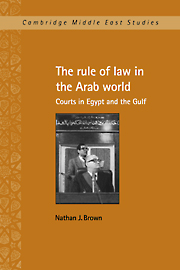Book contents
- Frontmatter
- Contents
- Preface
- Glossary
- 1 Arab courts in comparative perspective
- 2 The creation and operation of the modern Egyptian legal system, 1876–1937
- 3 Egyptian courts., 1937–1971: centralization, authoritarianism, and socialism
- 4 Egyptian courts, 1971–1996: the reemergence of liberal legality
- 5 Legal reform in the Arab states of the Gulf
- 6 The legal system and the rule of law in Kuwait and Qatar
- 7 Popular uses of the courts
- 8 Business and the courts
- Conclusion
- Bibliography
- Index
4 - Egyptian courts, 1971–1996: the reemergence of liberal legality
Published online by Cambridge University Press: 23 October 2009
- Frontmatter
- Contents
- Preface
- Glossary
- 1 Arab courts in comparative perspective
- 2 The creation and operation of the modern Egyptian legal system, 1876–1937
- 3 Egyptian courts., 1937–1971: centralization, authoritarianism, and socialism
- 4 Egyptian courts, 1971–1996: the reemergence of liberal legality
- 5 Legal reform in the Arab states of the Gulf
- 6 The legal system and the rule of law in Kuwait and Qatar
- 7 Popular uses of the courts
- 8 Business and the courts
- Conclusion
- Bibliography
- Index
Summary
In 1969, Egypt's political leaders made the decision to bring the judiciary under executive domination. More than any specific rulings made by the courts, the move seemed to stem from the corporate independence of the judges coupled with the ideological clash between the liberal legality of the judiciary and the aspirations of the regime for socialist transformation. Yet the commitment of the regime to socialist ideology was never unqualified, and it began to diminish rapidly in the 1970s. Indeed, official ideology gradually placed greater emphasis on the rule of law, democracy, and the independence of the judiciary. From 1971 on, the several measures taken during the massacre of the judiciary were either undone or transformed beyond recognition. By the mid-1980s, Egypt's judges had gained more ground than they had lost in 1969 in their efforts to assert their independence and corporate interests. While the impact of the measures taken in 1969 were potentially farreaching, the actual institutional changes were fairly modest; they were therefore not difficult to reverse. Yet the reemergence of liberal legality on an institutional level was still a very gradual process and it remains incomplete.
In this chapter, the historical record of the reassertion of liberal legality will be followed by an analysis of the limitations of the current institutional structure of Egypt's judiciary from a liberal standpoint. The chapter will conclude with a consideration of the nature of liberal legality in Egypt on an ideological level, its meaning, and the reasons for its reemergence.
- Type
- Chapter
- Information
- The Rule of Law in the Arab WorldCourts in Egypt and the Gulf, pp. 93 - 128Publisher: Cambridge University PressPrint publication year: 1997



